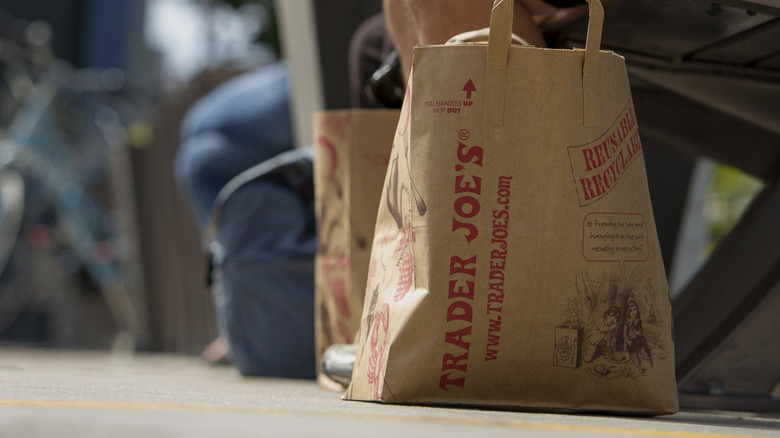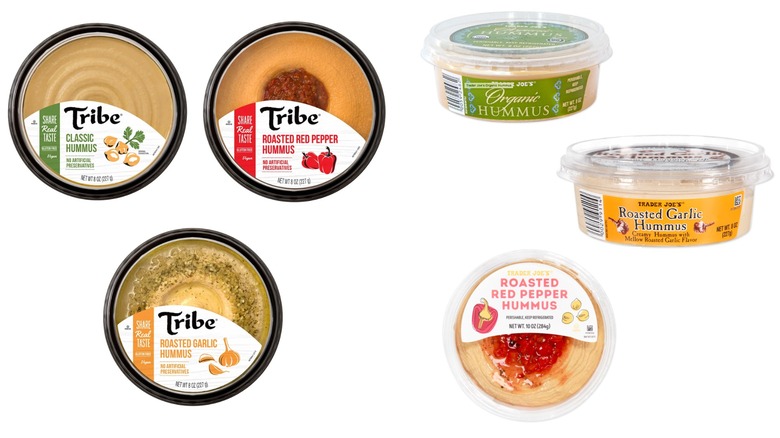The Popular Brand Behind Trader Joe's Hummus
Private-label products at Trader Joe's are fundamental to the supermarket chain's allure. From frozen meals to snacks to oat milk, and even TJ's own-label wine, these popular products set the supermarket apart from its competitors. Not only are they tasty, but they can often be significantly more affordable than their name-brand competitors. One of the most popular Trader Joe's products is its hummus. While it's not clear if it meets the standards of "Only Murders in the Building" character, Oliver "Dips for dinner!" Putnam, but we do know that millions of people love the stuff; the chain sells more than 4.4 million pounds of hummus every year across its 570-plus U.S. locations.
But who's making this tasty dip for Trader Joe's? And what's the big deal with all of those private-label products, anyway? Are they any better or different than the name-brand products? Grab some crudites and your favorite tub of dip as we go behind the label of Trader Joe's popular hummus.
Who makes Trader Joe's hummus?
The refrigerated section at Trader Joe's is one of the busiest spots in the store. It's teeming with ready meals, salads, and tubs of dips, spreads, and sauces from the TJ's green Zhoug sauce and chimichurri to salsa, guacamole, and, of course, hummus. Trader Joe's is known for rotating through limited-edition items, but it typically has several hummus varieties on offer (there are six listed on the Trader Joe's website as of publish time). All of its hummus options fall under the Trader Joe's private label, but the chain doesn't make the hummus itself — it works with co-packers instead.
According to MoneyWise, Bakkavor Foods, the largest prepared food provider in the United Kingdom (which has been expanding its presence in the United States), was linked to some of Trader Joe's hummus up until a 2016 listeria outbreak that forced a recall. At that time, it was making the Mediterranean hummus and the no-longer-available White Bean & Basil hummus. There's good reason to suspect Bakkavor is still making the Mediterranean hummus as it comes in a different container than the other hummus varieties. But the others, which include Roasted Red Pepper, Roasted Garlic, and Organic, are most likely made by popular hummus brand Tribe, according to Eater. But as with all of its house-brand products, Trader Joe's likes to keep its suppliers private.
Why do brands like private-label, anyway?
Private-label is big business — and not just at Trader Joe's. According to recent data from Statista, private-label products in the United States make up more than 17% of the total packaged goods category; private-label food and beverage sales were worth more than $110 billion in 2022. You'll see private-label products under house names like Trader Joe's, but oftentimes, supermarkets use other names like Costco's Kirkland label and Whole Foods' 365 brand. While it can be difficult to determine which is private-label and which isn't, a good indicator is a label that spans the aisles. If the same label is on hummus, shampoo, and dog food, there's a good chance that's the market's house label, whether it reflects the store's name or not.
Private-label is popular for several reasons, the biggest being price. Because stores don't need to spend money on marketing or brand development, there are higher profit margins on private-label products. The stores merchandise them next to top sellers (often the companies making the private-label products in the first place). Higher profit margins usually mean lower prices for the consumer, as is the case at Trader Joe's. Private labels also give supermarkets the ability to target niche markets that national brands may overlook, which means shoppers have more choices when it comes to unique flavors or international options. When that means six varieties of Trader Joe's hummus on any given day, what's not to love?


